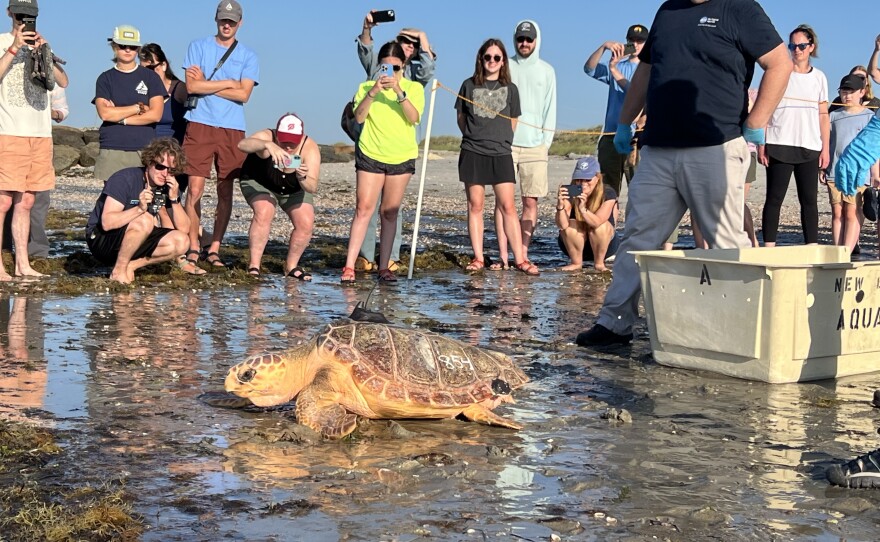Today was a great day to be a sea turtle, wild and free in Nantucket Sound.
Staff and volunteers from the New England Aquarium released 17 endangered and threatened turtles at West Dennis Beach after months of rehabilitation.
They were among more than 500 turtles found cold-stunned and stranded in Cape Cod Bay from November through January.
Onlookers lined the edge of a roped-off area as each turtle was lifted from a plastic bin and set gingerly on the sand. With a little help getting past the seaweed, the turtles used their flippers to head out into the gentle surf.
One critically endangered Kemp’s ridley turtle, Number 688, named Tyche, has been a hit on Instagram as it recovered from a serious head injury.
“A good chunk of its face was really, kind of, almost missing, very scabbed over,” said Adam Kennedy, director of the rescue and rehabilitation program at the New England Aquarium. “Not sure what caused it. … We were nervous that the jaw wasn't going to be able to consume food, and that the turtle might not make it.”
But Tyche made a great recovery and regained almost full use of its jaw. Whether Tyche or any of the turtles released today are male or female, it’s too soon to know; they’re too young, he said.
The aquarium released nine Kemp’s ridleys, along with five loggerheads and three green sea turtles. Nantucket Sound recently reached 65 degrees, the minimum temperature for the turtles to return to the ocean.
Each year, the aquarium triages cold-stunned turtles and treats them for hypothermia and other life-threatening conditions, such as pneumonia, dehydration, and trauma.
Many get transferred to other facilities around the country for rehabilitation. Turtles that need the most intense care stay at the aquarium’s Sea Turtle Hospital in Quincy.
On the beach today, a quiet cheer went up as a chestnut-and-cream loggerhead turtle named Helen made its way into the gentle surf. This year, the turtles are named after Greek mythology.
Zelayna Rauch seemed to know every turtle by name. Her husband volunteers feeding them.
“When you see them sick, and they hardly eat, and all that, and then you could bring them back to health, it's pretty exciting,” she said.
Ten of the turtles were carrying satellite tags, so the aquarium can follow where they swim. Those tags typically last up to a year. Eight of the ten turtles were also carrying acoustic tags, which can last for years but require the turtle to pass near a receiver for detection, Kennedy said.
More turtles than in the past are getting stuck in Cape Cod Bay in cold weather — and especially the critically endangered Kemp’s ridleys, most likely due to the warming of the Gulf of Maine, he said. Warm waters may draw more turtles north. Some of them get caught inside the arm of the Cape on their way south in the fall.
Releases are never done inside the bay, because it’s unclear if the turtles will find their way out.
“We always release in Nantucket Sound, because we're not sure if the turtles actually can navigate out of Cape Cod Bay,” he said. “Because as the … cold air comes in and the water gets colder, the turtles want to head south. Because of the shape of Cape cod, it keeps them in.”
Another 25 turtles are still recovering at the Sea Turtle Hospital. They will be released off Cape Cod once they get cleared by veterinarians.











